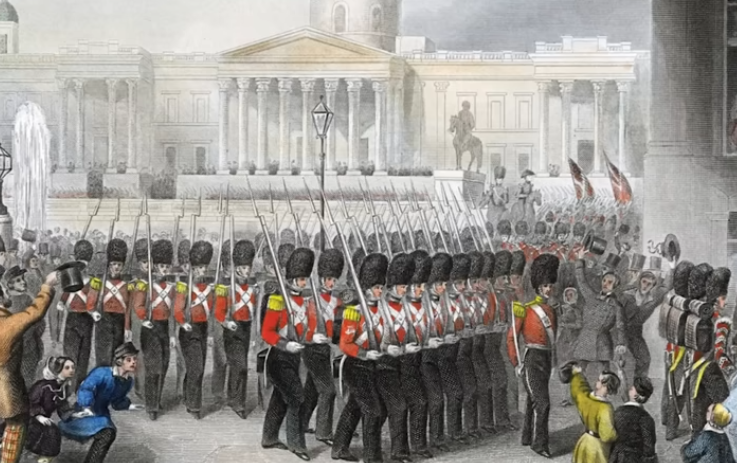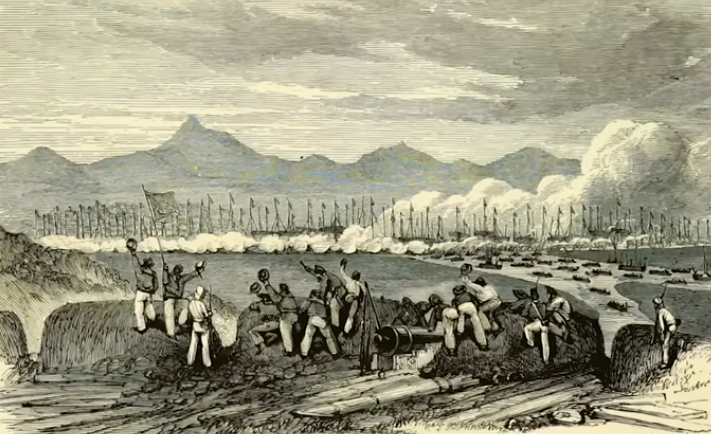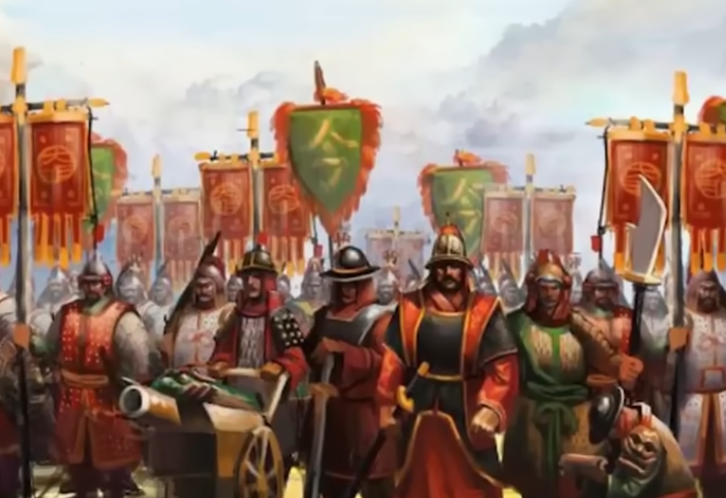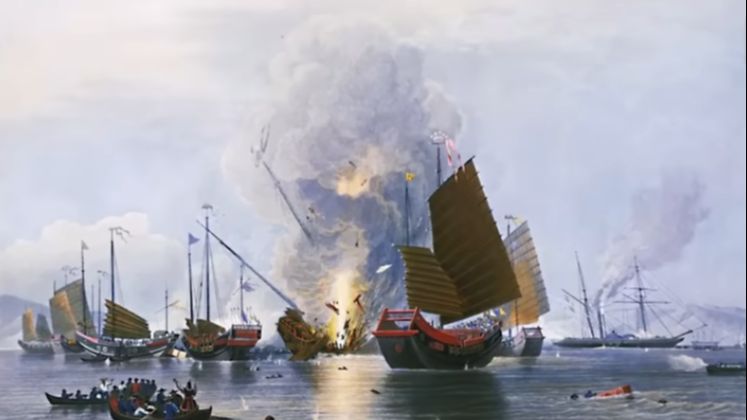The British, with a small number, defeated the large army of the Qing dynasty. Not only did they defeat them, but they also won overwhelmingly. We are in the 19th century when the world is changing rapidly.

In Europe, the industrial revolution has turned Britain into a superpower with a strong economy, advanced technology, and ambitions to expand across the globe. Meanwhile, in China, the Qing dynasty is in a state of decline. The court is corrupt, the economy is in crisis, the people are dissatisfied, and the army resembles a team lacking a good coach and clear tactics. The Opium War broke out for a very practical reason: money. The British wanted to sell opium from India and China to balance the trade deficit because they were addicted to Chinese tea, silk, and porcelain.
However, the Qing dynasty asserted that opium was illegal and banned its import. This led to conflict, and thus war broke out. There were two major Opium Wars, the first and the second, occurring in the 1830s, 40s, 50s, and 60s. In both instances, Britain won despite having far fewer troops than the Qing. Why was that? Let's start with the numbers, as this is the most interesting part to show the terrible disparity between the two sides. Regarding the British army, in the first Opium War, they mobilized about 4,000 to 5,000 soldiers in major battles, including British troops and mercenaries from India known as CPOs.
By the second war, the number increased slightly, to about 10,000 to 15,000 troops when they allied with France. It sounds like a lot, but compared to Britain's population at the time, which was about 26 million, this was just a very small force, like an expeditionary army. More importantly, the British did not need to deploy a large number of troops; their forces were concentrated on key battles, especially coastal assaults. The British did not attempt to occupy all of China, as that was impossible, but only captured important port cities like Guangzhou, Shanghai, or Tianjin to force the Qing to surrender.
What about the Qing dynasty?
The Qing could mobilize hundreds of thousands of troops in the first Opium War. It is estimated that they had about 100,000 to 200,000 troops participating in various fronts. By the second war, this number was even larger as they faced both the British and the French. With China's population at that time exceeding 400 million, the Qing clearly had the advantage in numbers. But there is a problem here: quantity does not always determine victory. If you have a football team with dozens of players but no one knows how to coordinate, no one practices systematically, and the coach is asleep on the bench, that is the situation of the Qing army. The Qing had many troops but lacked organization and discipline.
So why did the Qing lose despite having a force many times larger?

The answer lies in tactical equipment and morale. If the numbers were disparate, the equipment of both sides was separated by a century. This time, the tables turned. Britain at this time was the king of the industrial revolution. They brought to the battlefield weapons and technology that the Qing could only dream of. The British navy was the trump card in the Opium War. They used steam warships like the Nemesis, an armored ship powered by steam engines equipped with cannons and rockets. This ship could move upstream without relying on the wind, something the Qing's sailing ships could not do.
The Qing troops on the shore saw a huge iron ship spewing smoke rushing straight towards them at speeds two to three times faster than their boats, then firing cannonballs that exploded and destroyed fortifications. That was not war. It resembled a science fiction movie to the Chinese at that time. Additionally, they had modern sailing ships equipped with dozens of cannons. A single ship could carry dozens of such cannons, firing farther and more accurately than any weapon of the Qing.
On land, British soldiers were equipped with rifled muskets that had a longer range and were more accurate than the Qing's matchlocks. They also used modern cannons that could fire explosive shells or canister shots, causing significant damage over a wide area. British soldiers were trained to shoot in formation with rapid and accurate firing rates. Another noteworthy point is that the British army had professional artillerymen who knew how to use cannons to destroy enemy walls or fortifications from a distance. Meanwhile, the Qing had almost no concept of modern artillery.
Behind the British was an efficient logistics network thanks to colonies in India and Singapore. They could transport food, ammunition, and reinforcements from around the world to China in just a few months. Now, let's look at the Qing. The Qing army still used weapons and tactics from the Ming dynasty, which were outdated by several hundred years. The Qing navy mainly consisted of wooden sailing ships equipped with matchlock guns or small cannons, which fired slowly and inaccurately. These ships were easy to catch fire, easy to sink, and could not compete with the British steamships.

In the battle on the Zhujiang River, just a few British ships easily defeated an entire fleet of Qing vessels. The Qing also had no concept of a modern navy. Untrained sailors and commanders often did not know how to coordinate in the latest battles. As a result, the Qing navy was almost wiped out in the initial engagements. On land, the Qing army mainly used swords, spears, bows, and some outdated matchlocks. These guns took a long time to reload, were prone to moisture in rainy weather, and their range was, of course, far inferior to the British rifles.
While British soldiers fired continuously from a distance, the Qing troops had to stop, pour gunpowder, load bullets, and then fire a shot that might not even hit. The Qing's cannons were also very primitive, often being cannons cast from the previous century, heavy, difficult to move, and unable to fire far. Moreover, they lacked trained gunners, so their combat effectiveness was often very low. Fighting on home soil, the Qing's logistics system was a disaster. The army often lacked food, ammunition, and even basic items like shoes.
Provinces did not coordinate well with the central court, leading to the army in Guangzhou being under-resourced. Meanwhile, the granaries in Shanghai might still be full but were not dispatched. Corruption was also a major issue in the late stages of this dynasty. Many officials embezzled money and supplies, causing the army to become increasingly ineffective. Now, let's try a direct comparison of the navies. The British navy had armored steamships, modern cannons, and rockets. The Qing navy only had outdated wooden ships with small matchlock guns.
Regarding the British army, they had rifled muskets, modern artillery, and professional gunners. The Qing had swords, bows, and slow matchlocks. In terms of logistics, the British had a rapid global supply network. The Qing's logistics were outdated, corrupt, and lacked coordination. A typical example is the Battle of Dinghai in 1841 during the first Opium War. The British only needed a few warships and about 2,000 soldiers to defeat the Qing's large numbers and capture Dinghai Island. The secret was that they used steamships to maneuver quickly, bombard fortifications from a distance, and then land troops to capture the city. The Qing, despite being more numerous, could not withstand the overwhelming firepower and coordinated tactics of the British.
In contrast, the Qing still used medieval tactics, such as forming large numbers to overwhelm the enemy with quantity. But when faced with the British rifles and cannons, these formations merely became live targets. The British also lacked coordination between units, leading to being defeated piecemeal and retreating like a volcano. In terms of organization, the British army was well-trained, had strict discipline, and was commanded by professional officers. They knew how to coordinate between naval, land, and artillery units to maximize strength.
Meanwhile, the Qing army was a conglomerate of commanders, militia, and mercenaries. The generals often lacked experience in modern combat, and many were corrupt, selling off the army's food or weapons. Furthermore, the Qing at this time was in a state of exhaustion. The court was corrupt, officials were only concerned with embezzlement, and the people were dissatisfied due to high taxes and famine. The army was not paid, leading to very low morale. Some soldiers even deserted right before battles; moreover, the Qing also faced domestic uprisings like the Taiping Rebellion in the mid-19th century, forcing them to divide their forces to suppress them.

This made the forces at the main fronts even thinner. In the second Opium War, the British allied with the French, taking advantage of the conflict between France and the Qing. The cooperation of the two Western powers put the Qing at an even greater disadvantage. Meanwhile, China was almost isolated, lacking international allies, and the court was unfamiliar with modern diplomacy.
The result of the Opium Wars was unequal treaties such as the Treaty of Nanking and the Treaty of Tianjin. The Qing had to open ports, cede Hong Kong to Britain, and legalize opium trade. This was a painful slap to the dynasty. These stories also leave a significant lesson: technology and organization are more important than quantity. A small army that is well-equipped, well-trained, and has a clear strategy can defeat a much larger force. The Qing paid a heavy price for their conservatism, unwillingness to innovate, and ignorance of the outside world.
